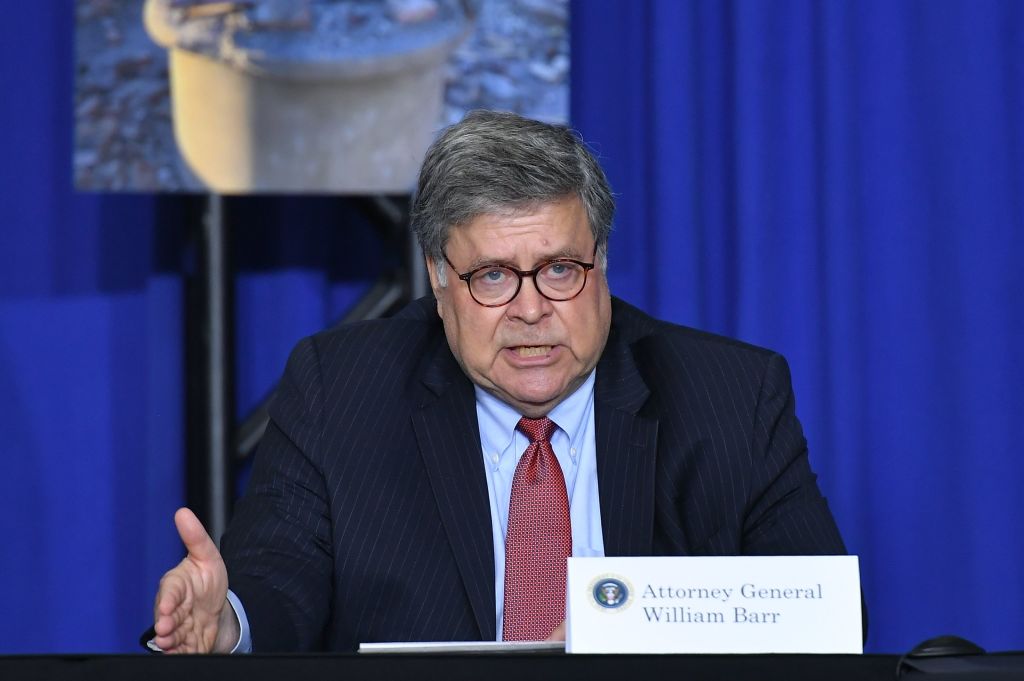Barr's big example of vote-by-mail fraud didn't happen, DOJ and local prosecutors say


A free daily email with the biggest news stories of the day – and the best features from TheWeek.com
You are now subscribed
Your newsletter sign-up was successful
Attorney General William Barr marshaled two pieces of evidence on CNN Wednesday to back up his assertion that expanding mail-in voting during the COVID-19 pandemic is "reckless and dangerous" and "playing with fire," leaving the election "very open to fraud and coercion." Neither claim looked very good 24 hours later.
First, Barr pointed to a 2005 Federal Election Reform report that found absentee ballots "remain the largest source of potential voter fraud." But former President Jimmy Carter, co-chairman of that commission, reminded everyone he endorsed mail-in voting in May, citing new anti-fraud safeguards. "I approve the use of absentee ballots and have been using them for more than five years," Carter said.
Barr's other example was more specific: "We indicted someone in Texas, 1,700 ballots collected, he — from people who could vote, he made them out and voted for the person he wanted to," Barr told CNN's Wolf Blitzer. A Justice Department spokeswoman initially pointed The Washington Post to a case in Dallas County involving suspected mail-in voting fraud in a city council election, but there was no federal indictment, and local prosecutors in the case said Barr had every detail wrong.
The Week
Escape your echo chamber. Get the facts behind the news, plus analysis from multiple perspectives.

Sign up for The Week's Free Newsletters
From our morning news briefing to a weekly Good News Newsletter, get the best of The Week delivered directly to your inbox.
From our morning news briefing to a weekly Good News Newsletter, get the best of The Week delivered directly to your inbox.
"That's not what happened at all," Andy Chatham, the assistant district attorney on the case, told the Post Thursday. His office did investigate 700 ballots all filled out with help from one "Jose Rodriguez," but "we didn't find any evidence of widespread voter fraud, and instead the ballots that were returned were consistent with the voter's choice," Chatham said, adding that at least in Dallas County, it's "incredibly simple to ferret out" fraudulent ballots. One man pleaded guilty to improperly returning a marked ballot.
Justice Department spokeswoman Kerri Kupec, given Chatham's account, told the Post that "prior to his interview, the attorney general was provided a memo prepared within the department that contained an inaccurate summary about the case which he relied upon when using the case as an example."
A free daily email with the biggest news stories of the day – and the best features from TheWeek.com
Peter has worked as a news and culture writer and editor at The Week since the site's launch in 2008. He covers politics, world affairs, religion and cultural currents. His journalism career began as a copy editor at a financial newswire and has included editorial positions at The New York Times Magazine, Facts on File, and Oregon State University.
-
 Political cartoons for February 16
Political cartoons for February 16Cartoons Monday’s political cartoons include President's Day, a valentine from the Epstein files, and more
-
 Regent Hong Kong: a tranquil haven with a prime waterfront spot
Regent Hong Kong: a tranquil haven with a prime waterfront spotThe Week Recommends The trendy hotel recently underwent an extensive two-year revamp
-
 The problem with diagnosing profound autism
The problem with diagnosing profound autismThe Explainer Experts are reconsidering the idea of autism as a spectrum, which could impact diagnoses and policy making for the condition
-
 Judge blocks Hegseth from punishing Kelly over video
Judge blocks Hegseth from punishing Kelly over videoSpeed Read Defense Secretary Pete Hegseth pushed for the senator to be demoted over a video in which he reminds military officials they should refuse illegal orders
-
 Trump’s EPA kills legal basis for federal climate policy
Trump’s EPA kills legal basis for federal climate policySpeed Read The government’s authority to regulate several planet-warming pollutants has been repealed
-
 House votes to end Trump’s Canada tariffs
House votes to end Trump’s Canada tariffsSpeed Read Six Republicans joined with Democrats to repeal the president’s tariffs
-
 Bondi, Democrats clash over Epstein in hearing
Bondi, Democrats clash over Epstein in hearingSpeed Read Attorney General Pam Bondi ignored survivors of convicted sex offender Jeffrey Epstein and demanded that Democrats apologize to Trump
-
 El Paso airspace closure tied to FAA-Pentagon standoff
El Paso airspace closure tied to FAA-Pentagon standoffSpeed Read The closure in the Texas border city stemmed from disagreements between the Federal Aviation Administration and Pentagon officials over drone-related tests
-
 Judge blocks Trump suit for Michigan voter rolls
Judge blocks Trump suit for Michigan voter rollsSpeed Read A Trump-appointed federal judge rejected the administration’s demand for voters’ personal data
-
 US to send 200 troops to Nigeria to train army
US to send 200 troops to Nigeria to train armySpeed Read Trump has accused the West African government of failing to protect Christians from terrorist attacks
-
 Grand jury rejects charging 6 Democrats for ‘orders’ video
Grand jury rejects charging 6 Democrats for ‘orders’ videoSpeed Read The jury refused to indict Democratic lawmakers for a video in which they urged military members to resist illegal orders
